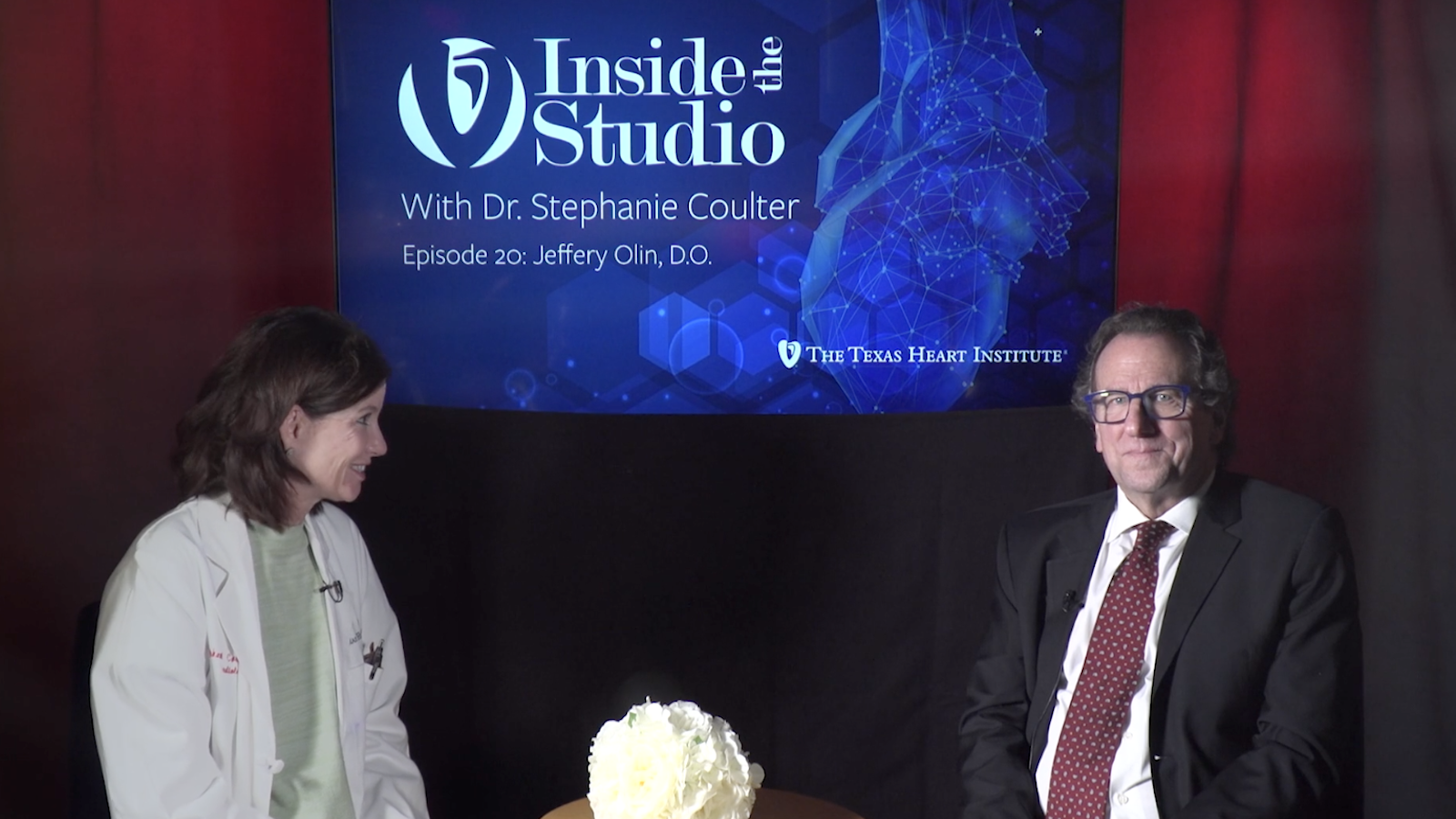Fibromuscular Dysplasia (FMD): The Rare Disease That Isn’t

The Texas Heart Institute welcomed Dr. Jeffrey W. Olin, Professor of Medicine and Director of Vascular Medicine and the Vascular Diagnostic Laboratory at the Icahn School of Medicine at Mount Sinai, to its historic Denton A. Cooley Auditorium to present Grand Rounds on the most recent clinical research from the National FMD Registry.
After his lecture “Fibromuscular Dysplasia: The Rare Disease That Isn’t,” Dr. Stephanie Coulter, Director of the Center for Women’s Heart & Vascular Health and Director of the Cardiovascular Disease Fellowship, interviewed Dr. Olin about the FMD registry and why he is so passionate about uncovering the mysteries of this condition that is not so rare after all.
FMD is a non-inflammatory, non-atherosclerotic disorder. Meaning it is not caused by inflammation or plaque buildup. The cause of FMD is still unknown and progress has been slow in understanding the epidemiology, pathogenesis and outcomes since its first description in 1938. The National FMD Registry, led by Dr. Olin is uncovering new information.
FMD causes narrowing or blockage of specific arteries in your body and also can lead to the bulging of an artery caused by the weakening of the artery wall (“aneurysm”) or a tear in the artery (“dissection”). When FMD causes arteries to narrow, the blood flow through those arteries is reduced, and the loss of blood flow to the organs can affect their function.
Women have a greater risk of FMD – 90% of patients with FMD are women. In the past, FMD was identified as a disease of young women, but lately this has changed. According to the United States FMD Registry, the average age at diagnosis is 52 years, ranging from 5 to 86 years.
Smoking increases a person’s risk of developing FMD. For people already diagnosed with the disease, smoking is a risk factor for more severe FMD.
High blood pressure is the most common complication. The narrowing of the arteries causes higher pressure on your artery walls, which can lead to further artery damage, heart disease, or heart failure. Another possible complication of FMD is a tear in the wall of your heart arteries (coronary arteries), causing a leak– known as arterial dissection or spontaneous coronary artery dissection (SCAD). The signs and symptoms of SCAD are shortness of breath, nausea, sweating, and chest pain. Also, SCAD can cause heart attacks.
FMD can weaken the walls of your arteries, creating a bulge called an aneurysm. If an aneurysm ruptures, it can be a life-threatening emergency. If you have a dissected artery leading to your brain, or if an aneurysm in an artery to your brain ruptures, you can have a stroke.
FMD is a subject of research investigation at The Texas Heart Institute (THI) in the Texas Heart Institute Center for Heart & Vascular Health. Contact Women@texasheart.org to learn more.
About the Women’s Heart Center
The Women’s Heart Center at the Texas Heart Institute Center for Cardiovascular Care provides health care for women that incorporates the latest women-focused research. We evaluate every woman carefully to create a personalized care plan that will improve health and wellness and empower women as they partner with us through every step of their journey. Our trusted team of compassionate women’s health experts brings together hundreds of years of experience and is led by the Director of The Texas Heart Institute’s Center for Women’s Heart & Vascular Health, Dr. Stephanie Coulter. Through coordinated patient-focused care, we pave the way for a better future for all women with cardiovascular disease through our unwavering commitment to excellence and improving the quality of life for our patients. By combining state-of-the-art health care with an integrative wellness approach, we have developed a progressive women’s heart program to treat heart conditions arising during pregnancy, spontaneous coronary artery dissection (SCAD) and Fibromuscular dysplasia (FMD,) Takotsubo cardiomyopathy, complex arrhythmia management, and other heart and vascular conditions disproportionately affecting women of all ages.
About Inside the Studio
Inside the Studio features interviews with special guests visiting The Texas Heart Institute’s TV studio. From international leaders in the fields of cardiovascular medicine to pioneering scientists to community leaders near and far, the Inside the Studio interviews amplify current trends in research and education related to the prevention, diagnosis, and treatment of heart and vascular disease.
About The Texas Heart Institute Cardiology Grand Rounds
The Texas Heart Institute Cardiology Grand Rounds provides a weekly opportunity to learn from leading medical and surgical experts, sharing the latest advancements and innovations in the diagnosis, treatment, and prevention of cardiovascular disease. THI offers complimentary CME credits for participation in Grand Rounds On-Demand. Visit The Grand Rounds Archive
Share Dr. Olin’s Grand Rounds presentation

.svg)


